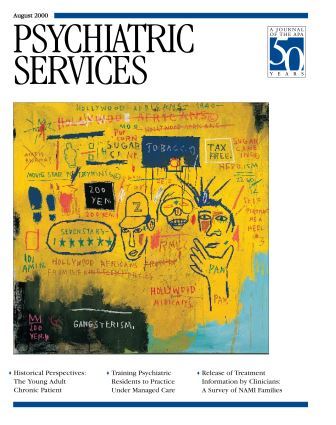To the Editor: The Jerusalem syndrome, which afflicts mainly ardent religious believers who go to Jerusalem and suffer psychotic decompensation while there, is gaining recognition in the professional literature as well as in the media (
1,
2). We recently encountered for the first time a patient, apparently suffering from the Jerusalem syndrome, who believed that a "Jerusalem syndrome organization" was acting against him, thus making his diagnostic category the object of his paranoia.
The patient, a 38 year-old U.S. citizen, divorced and father of two, was brought to the psychiatric emergency room of the mental health center in Jerusalem after being arrested by the police for assault. He refused to discuss his past psychiatric history, but his family reported that he had always been "strange and unbalanced," eventually leaving his home, cutting all ties with his parents and his wife and children, and disappearing for years on end.
He decided to come to Jerusalem to devote himself to the study of the Bible, both the Old and New Testaments. He worked in a hotel in return for a bed and spent most of his time reading religious material. A few months before his admission to the mental health center, he began claiming that the Jerusalem syndrome organization was after him. He identified other tourists staying at the hotel as well as the hotel staff as being secret agents of the organization. He believed that his roommate was following him and performing electric shocks on him, which he felt throughout his body.
Eventually, the patient identified more and more people as hostile secret agents of the organization, and he became increasingly restless and aggressive. He reported that the agents set him free periodically, leaving him alone, only to reappear in increased numbers and from all directions. After physically assaulting one such "agent" from hotel personnel in an attempt to defend himself against the organization, he was taken by the police for psychiatric evaluation and treatment.
On admission to the mental health center, the patient was found to be overtly psychotic, negativistic, delusional, and hallucinatory. He accused the staff of being part of the Jerusalem syndrome organization intent on poisoning him through food, drink, and medications. Treatment with haloperidol seemed to improve his capacity to cooperate but, to date, he still believes that the organization is pursuing him.

